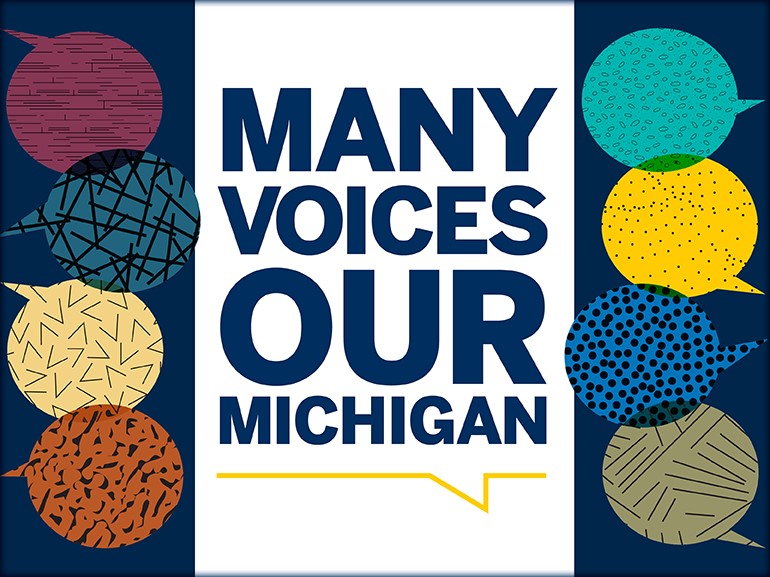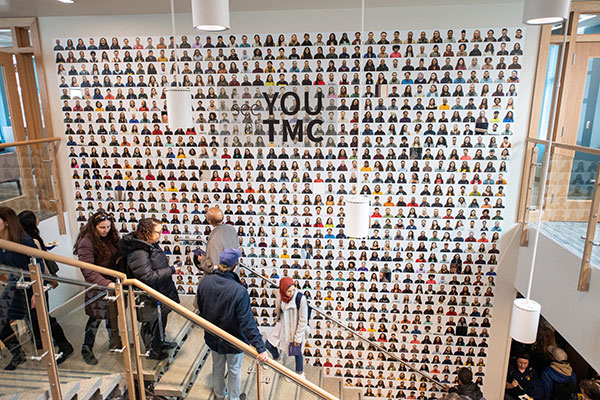Campus Climate
The university’s organizational climate is a mosaic of the unique missions, objectives, cultures and values of each individual unit. Although all unit strategic plans share common goals and are intended to promote greater openness and inclusivity, the individual action items themselves are wide-ranging. Accordingly, the campuswide action items are designed to support and strengthen the development of programs, policies and activities that encourage a culture of belonging in which every member of our community can grow and thrive.
"My learning community allowed me to feel open about expressing myself and my identity on campus."
— Noah Streng, Undergraduate Student
Campuswide Climate Survey

Achievements in Year Four include archiving and release of university-level sampling climate survey data to units in order to provide a baseline against future progress in support of DEI. Building on efforts to provide university-level and unit-level climate survey data, in Year Four we focused on assuring broader access. To this end, university-level sampling climate survey data was made available through public-use data files available for access by the general public via direct download from the Inter-university Consortium for Political and Social Research (ICPSR 37096) website or from the DEI website. Access does not require affiliation with an ICPSR member institution. To date, there have been 4,492 climate data downloads representing 492 individual users from 43 institutions nationwide. These efforts were supported through an ongoing partnership among ODEI, the Institute for Social Research (ISR) and the independent research firm SoundRocket.
Year Five campus climate sampling survey planned for winter 2021
Diversity, Equity and Inclusion Contributions in Staff Evaluations
In Year Four, Organizational Learning continued its ongoing efforts to socialize the Michigan Expectations Model. Some units on campus piloted training programs such as "Impactful Conversations" to be used by or with supervisors to help them have open and honest dialogue during the performance review process. In addition, there are many units across the organization that have folded DEI course attendance into the professional development components of their performance reviews. Since the launch of the five-year DEI Strategic Plan in 2016, participation in Organizational Learning DEI educational sessions totals 30,878 staff members - and growing.
DEI Lifelong Learning framework offers rubric for staff evaluation processes
Diversity, Equity and Inclusion Education and Training Resources
In Year Four, Organizational Learning (OL) used its DEI Lifelong Learning Model to design educational resources for numerous stakeholder groups and diversity committees across campus and at Michigan Medicine. With the help of our expanded Facilitator Engagement Program and with input from our Education and Learning Advisory Group (ELAG), we added new instructor-led courses and webinars to support the initial two phases of our three-stage approach to learning: awareness, practice and modeling. Topics ranged from “Growing Your Cultural Intelligence” and “Disability Awareness and Etiquette” to “Inclusive Leadership.” By the end of June, 2020, 4,195 faculty and staff had attended 158 sessions. Since the campuswide DEI launch in October 2016, OL and through June, 2020 Michigan Medicine have together offered 1,049 instructor-led sessions serving 30,878 participants, engaging all units that submitted a DEI plan.
Created the “Anti-Racism Primer: What Can I Do?” online module which has over 1,000 subscribers - and growing
Inclusive Facilities
In Year Three, the U-M Student IDEA (Inclusion, Diversity, Equity, and Accessibility) Board was created to assess U-M’s infrastructure in terms of its ability to support and include students who are impacted by barriers within the university culture relating to disability, accessibility or ableism. The specific task was to generate actionable recommendations that could be attained within a short-to-medium-term timeline, in a collective and collaborative way. Using an approach the board referred to as Universal Design for Living, members set about the work of creating an institution that is both accessible and proactive in all aspects. In December of Year Four, they presented their recommendations. Since then, the Provost's Office has planned and implemented strategies for achieving a number of those initiatives. This work is ongoing.
IDEA Board recommendations for creating an accessible and proactive institution shared in December 2019
Increased Web and Online Accessibility Testing
Throughout the fiscal year, the Digital Information Accessibility Coordinator (DIAC) worked collaboratively with ITS and other units as an “accessibility team” to complete reviews. Together, they created and broadly disseminated resources aimed at helping units conduct online reviews and remediate their electronic and digital materials. These resources included in-person training, online tools and how-to documents containing general guidance and helpful hints. In addition, the accessibility team used fiscal-year grant funding to hire an intern who assisted with numerous efforts to increase digital accessibility, including reviews of university web resources.
New training, tools, and how-to guides shared with units for accessibility reviews
Innovative Pilot Program for Students to Promote Intercultural Development
Piloted in 2016, the Intercultural Development Inventory has become a major component of the intercultural learning modules offered within the Trotter Multicultural Center (TMC). Anchoring this work in the TMC has allowed for ongoing development of the IDI alongside other tools such as the Intercultural Conflict Styles Inventory, the Cultural Intelligence Assessment and the Cultural Values Profile. In Year Four, we continued to advance student learning through partnerships that integrate these tools into curricular and co-curricular spaces, with the goal of increasing students’ capacity to engage across differences in identity and culture. The Trotter Multicultural Center also increased its staffing levels in support of Intercultural Learning.
1,116 participants participated in group interpretation sessions for their Intercultural Development Inventory (IDI) results
Professional Development in Diversity, Equity and Inclusion for Deans and Executive Leadership
Due to transitions within the Office of the Provost, as well as priorities dictated by the COVID-19 pandemic, planned activities for the 2019-2020 academic year were delayed. Future sessions for executive officers and deans will build on the two previous DEI skill-building retreats planned and executed in partnership with the Department of Organizational Learning. Sessions will be designed to achieve the four established goals for this work: 1) deepen alignment and commitment to advance DEI objectives, with an emphasis on culture/climate change; 2) foster and enhance collaborations and connections across U-M senior leadership; 3) strengthen individual and team capacities in DEI leadership; and 4) solicit input in the creation of a roadmap for senior leadership development in DEI.
Building on past DEI skill building sessions, follow up sessions with executive leaders are planned for the coming year
Raise Awareness About Reporting Campus Climate Concerns
In Year Four, Student Life led U-M’s institutional shift from bias response to a framework of campus climate support. We prioritized the implementation of a responsive and flexible campus climate support model. We also built on current strategic efforts to improve campus response and support for climate concerns by working to ensure that all U-M students are aware of and engaging in the campus climate support work. Given the complementary goals, all Year Four updates on this action are included as part of “Student Support and Resources to Improve the Campus Climate.” In Year Five, “Raise Awareness About Reporting Campus Climate Concerns” will no longer exist as a separate campuswide action item.
Shifted to framework of campus climate support and increased communication with students about campus climate concerns
Student Support and Resources to Improve the Campus Climate
In Year Four, Student Life continued to lead the shift from a framework of bias reporting to campus climate support, with a focus on building a stronger, more connected set of campus services. New initiatives included workshops in respectful communities; anti-racism and coalition building teach-ins; and training sessions in sexual assault policy and prevention, hazing, bystander intervention, and coping skills. During the pandemic, Student Life launched support services ranging from emergency financial assistance to tele-counseling, wellness coaching, and critical incident case management.
Supported over 400 students with critical incident case management services and 500 shoppers at the Maize and Blue Cupboard
Trotter Multicultural Center

Since its grand reopening in April 2019, the new Trotter Multicultural Center (TMC) has become a hub for community engagement and intercultural development. In Year Four, TMC was the site for 11 wide-ranging academic courses as well as an array of innovative special events centered on collaborative thinking, interactive social action, leadership, transformation and interfaith education and exploration.
TMC supported 1,900 room reservations and was the site of 11 academic courses on a range of DEI topics in 2019-2020